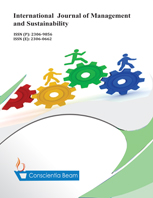The influence of board gender diversity and ownership structure on integrated reporting: Evidence from Malaysia
DOI:
https://doi.org/10.18488/11.v13i3.3832Abstract
This study examines the influence of board gender diversity and ownership structure on integrated reporting. Integrated reporting is widely regarded as a report providing the most comprehensive and valuable information regarding an organization's performance and value creation, offering significant benefits in improving stakeholder relations. This type of reporting is expected to accurately represent existing relationships between organizations and their stakeholders by focusing on investors and other stakeholders. Therefore, the purpose of this study is to examine the influence of gender diversity and the role of ownership structure in an integrated reporting context. In order to elucidate the relationships among the variables in this study, the agency theory was utilized. The sample of the study was derived from the top 100 Malaysian companies based on market capitalization for the years 2018 to 2020. The content analysis approach was employed to hand-collect the data from the annual reports. The findings of this study show a positive and significant relationship between board gender diversity and government ownership with integrated reporting. However, this study found a negative and significant relationship between family and foreign ownership with integrated reporting. This study could assist company owners and management in improving their company's information disclosure practices. Also, companies might consider adopting policies and practices that promote gender diversity in leadership roles and optimize ownership structures to enhance their integrated reporting practices. Additionally, regulatory authorities might find the results of this study valuable in formulating effective policies aimed at advancing integrated reporting.

